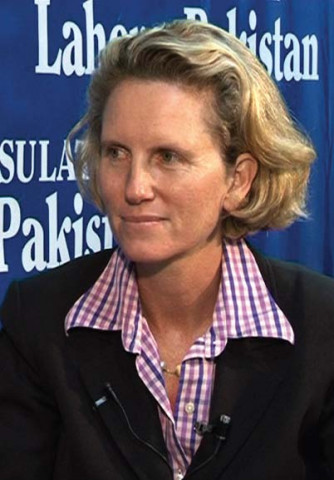The Girl Effect: education and fertility
Higher rates of educated women would lower fertility rate and make the country less prone to extremism, says Coleman.

“When the education rates for women are higher, the fertility rate in the country declines,” Coleman said, labelling the correlation as the Girl Effect. “The advantages of investing in women range from having fewer and healthier children to making their country more prosperous and less prone to extremism,” she added.
A senior fellow at the Council on Foreign Relations (CFR) and an author, Coleman was in the city this week for a series of lectures.
In an exclusive interview with The Express Tribune, Coleman explored wide-ranging issues relating to American foreign policy in the region in addition to explaining the Girl Effect.
“The female population represents a critical economic importance,” Coleman said.
Her latest book Paradise Beneath the Feet that was released in April, discusses the topic of how women in the Middle East and countries such as Pakistan are finding solutions, within Islam, to bring about social, educational and economic changes by exploring the opportunities.
While talking about the war on terror, Coleman said, “At this point Bin Laden’s capture has a psychic value because of he’s a ‘global brand’”.
She said that though the US authorities believed that Bin Laden was hiding somewhere in Afghanistan or Pakistan, she believed that eventually al Qaeda and its affiliates would go to other countries for a safe haven.
When asked about the US strategy in Afghanistan, Coleman said the US was trying to pull out of Afghanistan without pushing the country back into a civil war.
“There is recognition within the US that we cannot fight our way to freedom.
We also know that we cannot walk away, like before,” she added.
She said that the situation in Afghanistan was still tricky, “The Marjah operation showed that despite occupying the area it would take longer than we thought to secure the area.
Kandahar operation had also shown mixed results,” Coleman said.
Wary of the media, Coleman said that by focusing too much on the positives, the media had made it hard to assess the ground situation in Afghanistan.
If the US were to be successful in Afghanistan, there would be more incentive for the forces to stay in the country, Coleman said.
Expressing her views on the relationship between Pakistan and India Coleman said that the recent NATO supply trucks issue had made apparent the complexities of the relationship.
She said that the Pakistan government had made it very clear that they will not send troops into North Waziristan. “The Pakistani Army has faced a lot of casualties and wants to retain its leverage in the region,” she said.
Published in The Express Tribune, October 22nd, 2010.



















COMMENTS
Comments are moderated and generally will be posted if they are on-topic and not abusive.
For more information, please see our Comments FAQ